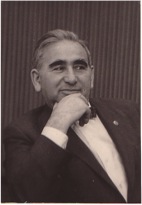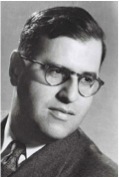(September 1947)
David Horowitz, State in the Making, New York: Alfred Knopf, 1953, pp. 233-235.
In the 1930s, Zionist leaders at times approached Arabs living in Palestine seeking a dialogue on how to perhaps narrow the nationalist differences between the two communities. David Ben-Gurion, the head of the Jewish Agency at various times, had discussions with members of the Nashashibi family in Jerusalem, Awni Abd al-Hadi, a staunch Palestinian nationalist, and in the 1940s with Musa al-Alami. In the 1940s as well, just after the publication of the August 1947 United Nations Special Committee Report on Palestine, which called for Arab and Jewish states in Palestine, an international regime for Jerusalem and an economic union between the two proposed states, Zionists continued their dialogue with Arab leaders in surrounding states. They had discussions with Emir Abdullah of Jordan, various Syrian Arab leaders, and in September 1947 with the noted Egyptian nationalist ‘Azzam Pasha, who was the first Secretary General of the Arab League (1945-1952). The three members of the Jewish Agency who met with ‘Azzam Pasha were Aubrey (Abba) Eban, Jon Kimche, and David Horowitz, all worked for the Jewish Agency in Palestine. They met with him at the Savoy Hotel in London, on September 16, 1947. Horowitz’s account of that meeting revealed ‘Azzam Pasha’s total rejection of a Jewish State, his suggestion that violence would be the only recourse, and his speculation that Palestine might be lost to Arab control. The Zionist’s efforts at building a dialogue with Palestinian or Arab League leader were unsuccessful in terms of either duration or substance. ’Azzam Pasha’s thoroughly antagonistic view of Zionism is found in this description of that meeting.
– Ken Stein, May 2011

He [Jon Kimche] phoned one morning, out of a clear sky, and said it was possible to arrange an interview with Abdul Rahman Azzam Pasha, leader and secretary-general of the Arab League. I at once agreed, and an appointment was made for five o’clock the following afternoon.
Aubrey, Jon Kimche and I went to the Savoy Hotel, where Azzam Pasha was staying, and a short while later were sitting with a swarthy, lean-faced Arab with dark piercing eyes, who received us with great courtesy.
I opened the conversation. After setting out my view of UNSCOP’s report, I turned to analyze the situation: “The Jews are a fait accompli in the Middle East. Sooner or later the Arabs will have to reconcile themselves to the fact and accept it. You Arabs cannot wipe out or exterminate over a half a million people. We, for our part, are genuinely desirous of an agreement with the Arabs and are prepared to make sacrifices for one.
“Such an agreement will be reached in time, so why precede it by squabbling, fighting and bloodshed? There are no conflicting fundamental interests and insuperable obstacles involved in any agreement. We’re not hankering after expansion, conquest, or domination of other peoples. We want to become integrated in the fabric of the Middle East so that we can be mutually beneficial.
“We know that it’s a vital interest for us. I understand that you don’t wish to rely on assurances and lofty sentiments. Consequently, we’re ready to propose a concrete plan for co-ordination of interests and a real peace between the two peoples.
“The plan is in three parts:
“First, political: that is, an arrangement with the Arab League based on a system of well-defined rights and obligations.

“Secondly, security, which will have the effect of dissipating your groundless suspicions of our alleged expansionist ambitions, though we keep on declaring and repeating that our sole object is to in-gather the hundreds of thousands of our brethren within the bounds prescribed for us to revive the wilderness, and despite the fact that any attempt on our part to break out of this frame will be met with the opposition of the entire world. We’re ready to give you concrete guarantees, both from ourselves and from the United Nations.
“Finally, the plan will have an economic section to be drawn up in consultation between the parties and will deal with the conjoint development of the Middle East, to the advantage and prosperity of the Arab masses.”
Azzam Pasha: “The Arab world is not in a compromising mood. It’s likely, Mr. Horowitz, that your plan is rational and logical, but the fate of nations is not decided by rational logic. Nations never concede; they fight. You won’t get anything by peaceful means or compromise. You can, perhaps, get something, but only by the force of arms. We shall try to defeat you. I’m not sure we’ll succeed, but we’ll try. We were able to drive out the Crusaders, but on the other hand we lost Spain and Persia. It may be that we shall lose Palestine. But it’s too late to talk of peaceful solutions.”
Aubrey Eban: “The UNSCOP report establishes the possibility of a satisfactory compromise. Why shouldn’t we at least make an effort to reach an agreement on those lines? At all events, our proposal is a first draft only and we shall welcome any counterproposal from your side”
Azzam Pasha: “An agreement will only be acceptable at our terms. The Arab world regards you as invaders and is ready to fight you. The conflict of interests among nations is, for the most part, not amenable to any settlement except armed clash”
Horowitz: “Then you believe in the force of arms alone? You don’t think there has been any progress whatsoever in the settlement of controversial issues among different peoples?”
Azzam Pasha: “It’s in the nature of peoples to aspire to expansion and fight for what they think is vital. It’s possible I don’t represent, in the full sense of the word, the new spirit that animates my people. My young son, who yearns to fight, undoubtedly represents it better than I do. He no longer believes in us of the older generation.
When he came back from one of the more violent student demonstrations against the British, I told him that in my opinion the British would evacuate Egypt without the need for his demonstrations. He asked me in surprise: ‘But, Father, are you really so pro-British?’
“The forces which motivate people are not subject to our control. They’re objective forces. It may have been possible in the past to have reached agreement if there’d been amalgamation from below. But it’s no longer feasible. You speak of the Middle East. We don’t recognize that conception. We only think in terms of the Arab world. Nationalism, that’s a greater force than any that drives us. We don’t need economic development with your assistance. We have only one test, the test of strength. If I were a Zionist leader, I might have behaved the way you’re doing. You have no alternative. In all events, the problem now is only soluble by the force of arms.”
Azzam Pasha’s forcefulness and fanaticism impressed us deeply. His world-outlook had something of the biological determinism of racial theory. The realistic picture he painted was a fatalistic one of objective, almost blind forces erupting and spilling over unchecked on the stage of history.
Azzam proclaimed his attachment to democratic principles in our ensuing conversation, it was true, but his extreme beliefs bordered on a fascist world-conception. The admiration of force and violence which was evident in his statements seemed to us both strange and repugnant, and his description of any attempt at compromise or peace as a naïve illusion left no door of hope open.
In spite of the amiable, even cordial atmosphere, we felt the full historic impact of this dramatic encounter. With it vanished the last effort to bridge the gulf. The final illusion of reaching an agreed and peaceful solution had been exploded.
We left the hotel and crossed over into the Strand both stirred and depressed. Azzam had managed to impart something of his spirit and outlook to us. We saw looming up before us latent, powerful forces pushing us irresistibly and inescapably toward the brink of a sanguinary war, the outcome of which none could prophesy.”
